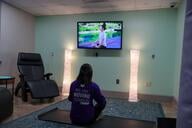You have /5 articles left.
Sign up for a free account or log in.
With unrest and protests against police brutality now having spread to most major American cities, what was once the big story in higher education -- the coming fall term and its implications -- has faded to the background.
But in that background, things continue to move. And colleges and universities continue to lay plans and make announcements about their coming terms.
Changing the academic calendar has been a popular option for administrators who are hoping to reopen campuses. Many institutions, including Michigan State University, Virginia Polytechnic Institute and State University and Miami University of Ohio have followed the trend set by others, such as the University of Notre Dame, for a fall semester that either ends or goes online by Thanksgiving. Sending students home early can help avoid the second wave of coronavirus cases predicted by some experts, administrators said. Most of these universities also have chosen to forgo a fall break, typically held in October, this coming school year.
Other institutions have said they will expand their normal terms over the course of the year, as a way to make classes and campuses less dense. Stanford University, for example, announced that in addition to beginning and ending the fall quarter early, the university will spread instruction over four quarters, including the summer. Only about half of undergraduates will be allowed on campus in fall. Students who are permitted on campus will switch with their peers each subsequent quarter.
"Since most students take courses over three quarters, under our default scenario the four-quarter year would allow all Stanford undergraduates to complete two quarters of instruction in residence on the Stanford campus in 2020-21, and require most to complete at least one quarter remotely," the university said in an announcement. The plan also will allow the administration to set aside sufficient housing for quarantine and self-isolation.
Columbia University told students it will be spreading its full-time, nine-month master's of journalism program over 12 months, with incoming students given the option of enrolling from August to May or January to August. "We will accommodate the first choices of as many students as possible, and we expect to be able to accommodate a great many, and possibly all," the university told incoming students in an email.
Stanford and many others have said that classes will take place earlier and later in the day to make classrooms less dense, although little has been said in these announcements about how instructors who face challenges because of these changes, such as increased childcare needs, may be accommodated.
Other universities have been preparing for hybrid learning. For example, Wichita State University plans to have students return to campus and residence halls, but all traditional instruction classes will be moved to a hybrid model, meaning limited in-person instruction.
The University of Texas at Austin said it will move as many as 2,100 fall courses exclusively online, about 20 percent of all courses offered. Students can choose to take all their classes online and not return to campus, although they will pay the same tuition as on-campus students. The university has joined others in saying it will end in-person classes by Thanksgiving.
The University System of Maryland similarly announced that each campus likely will hold a certain number of lecture courses online, even if students are on campus.
Enforcing Social Distancing?
Guidelines from the American College Health Association have paid particular attention to residence halls, which some in epidemiology have likened to cruise ships for their ability to aid in the spread of disease. ACHA advised colleges to give each student on campus a private room, preferably with a private bathroom.
While some colleges, such as William Jewell College and Campbell University, have heeded this call, others have not made announcements regarding residence halls or have focused on converting triple dorm rooms to double rooms. The University of California, San Diego, and Texas A&M at San Antonio are among those that have said they will not place students in triples.
The University of Colorado at Boulder released a unique plan for residence halls that involves residential undergraduate students living and taking courses in a cohort -- that is, taking classes with the small group that they also live with. Incoming commuter students also will have a cohort schedule, a model that is currently used in K-12 education as well as law schools.
“They may take three to four classes each, and so that reduces the number of individuals they would be in contact with,” Philip DiStefano, the Boulder campus chancellor, told CNN. “In a regular semester, they may have 40 or 50 different students that they would be interacting with rather than just 10. And we believe that by reducing that population density, we’ll certainly help to mitigate some of the problems with the virus.”
ACHA guidelines also recommend colleges require face coverings in all residential common areas and encourage them in academic settings.
Many colleges have said they will provide training on guidelines as well as masks and hand sanitizer. Some, including Stanford, also have said they will expect students to stay local during the fall and avoid unnecessary travel.
Whether or not colleges will choose to enforce these guidelines with punitive measures still remains to be seen. Although large parties are a hallmark of some students' experiences, colleges have largely not made announcements about what, if anything, will be done to prevent large unofficial gatherings.
Christina Paxson, the president of Brown University, told CNBC that she believes students will participate in the measures and adhere to guidelines.
"We can't force someone to do tracing," she said. "But I think it's an essential component of public health, and if they understand that by doing that they're keeping themselves and their communities safe, I think they'll buy in to it."
Punitive measures to enforce social distancing may be unpopular with students. In the spring, Princeton University told students on campus that if they were caught not following social distancing guidelines they could be evicted from on-campus housing. Some students said this was unnecessarily strict and dangerous for students who had nowhere else to go.
Among the new reopening plans, a few institutions have said they are expecting to be fully or mostly online in the fall. Many community colleges have made such an announcement, as have Fuller Theological Seminary, Iliff School of Theology and Eastern Washington University. Six of Harvard University's schools, including its medical and law schools, have said instruction will be online in the fall, joining the California State University system and McGill University.
As the country reopens businesses and allows for outdoor gatherings, several states have seen their new daily coronavirus cases grow. In Florida, the past week has seen the most cases added in a seven-day period since early April, when the state was at its peak. On Thursday, California also reached a new peak in its seven-day average of new daily cases. In that week the state averaged over 2,600 new cases each day.
In the first five days of June, the coronavirus killed 4,329 people in the U.S. In total it has killed over 111,000 Americans.




